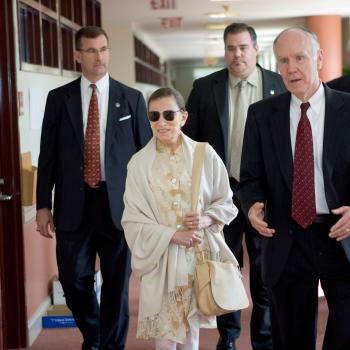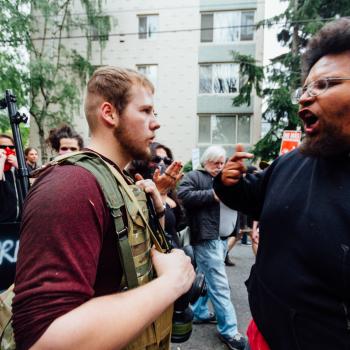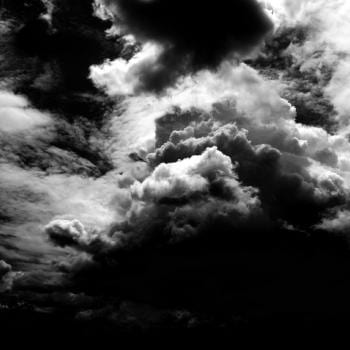In the year 1970, The Last Poets and Gil Scott-Heron released a pair of related spoken word poems that would change the way black America saw race, justice and revolution. The Last Poets, in “When The Revolution Comes,” railed against the colonizing powers of capitalism and Christianity, and Gil Scott-Heron’s “The Revolution Will Not Be Televised” spoke in great detail to the pacifying effects of pop culture.
Both challenged the complicity of those who would rather stay home and catch the revolution on TV.
As a white Christian consumer of capitalist culture, and a student of American history, these poems challenge me as well. “The lie that enslaved our mothers.” The image of Jesus trying to catch a cab out of Harlem. “Preacher pimps […] with the communion wine stuck in their back pockets.” When the revolution comes, it will almost surely be people like me they are fighting against.
Facing History
When Columbus stumbled onto the Americas, he brought soldiers, sailors—and priests. The genocide that followed was deeply rooted in the Christian faith. When the slave trade repopulated the Americas with stolen lives and labor, Christian ministers scrambled to justify it. The Ku Klux Klan, the oldest hate group in the United States, is a Christian organization. The second largest Christian denomination in the U.S., the Southern Baptist Convention, was born as a protest against abolition and civil rights. Rev. Fred Phelps is every bit as much a part of the Christian tradition as Rev. Dr. Martin Luther King, Jr. No amount of explaining can change these facts.
But still, here we are in the year 2020. Mid-Pandemic. And the church we have inherited is the only church we’ve got.
I would like to say that the church is better. That we are doing better. I would like to shout from the mountaintops that the new Christian church is not the same as the old Christian church, and that genocide and slavery could never happen the same way again.
But I can’t, because lying violates the Eighth Commandment.
Revolutionary Christ
On the most fundamental levels, any real understanding of Jesus has to ground itself in the fact that he was a first-century Jew. When Christ came incarnate, he came as a member of a people who had been enslaved and oppressed again and again throughout all of history, but had persevered and rebuilt each and every time. When Christ came incarnate, he came as a member of an occupied people, subject to Roman rule. He was a child refugee, homeless and poor, and almost certainly a person of color. Yet somehow, his entire public ministry became a single, sustained act of speaking truth to power and lifting up the blessed, broken people of all nations that he came to speak for.
Jesus the Christ was a revolutionary, and every account agrees that he died for it.
Beatific Savior
This Sunday, Christians around the world will celebrate Christ’s great act of protest as he rode into Jerusalem on a donkey, while the people sang psalms and laid down their cloaks and branches before him. Over the next week, we will observe Christ becoming the victim of a broken justice system, martyred for the simple act of bringing hope to an oppressed people.
Yet often the details get lost. What did Jesus die for? What Good News was so revolutionary that not only the empire, but Christ’s own religion, could not allow it to spread? What great heresy could possibly be this dangerous?
The answer, of course, is love. Love for God. Love for neighbor. These are Christ’s two great commandments, and everything else hangs on them (Mt. 22:37-40). Whom shall we love, and how shall we love them? Blessed are the humble, the mournful, the meek. Blessed are those who hunger and thirst for righteousness. Blessed the merciful, the pure, the peacemakers and the persecuted. These are the core beatitudes of Christ’s message to humankind (Mt. 5:3-12).
Rising Son
The powers of evil are very much alive in the world, and in the Christian church. The sins identified by Gil Scott-Heron and the Last Poets have not gone away. Racism, fascism, homophobia, transphobia, xenophobia—these are our legacy, and our cross to bear.
In a recent discussion with David Hodd, pastor of Gethsemanee United Methodist Church in Lino Lakes, Minnesota, he spoke of today’s Easter Christian as living “between the cross and the resurrection.” On Easter Sunday, the Christian church in all its complication will come together to declare the Paschal greeting, “He is Risen! He is Risen indeed!” But those who mean this rising as a finished act will be speaking of a dead faith. The truth is that not only has Christ risen, but he has been rising for two thousand years, and he is still rising today. The work is not done. The resurrection and revolution are ongoing, and largely untelevised. It is the mission and the obligation of the 21st-century progressive church to not only not deny our troubled history, but also embrace it, engage it, challenge it as we know Christ would, and do all the things that are in our power to clear the way for a new, and better, day.
Christ is rising. He is rising indeed. It is up to us to rise with him.
Amen.
________













